 Xbox 360, Microsoft’s successor to their popular Xbox gaming console, will be “unleashed” tonight at a celebrity-packed launch broadcast on MTV, which shows at 8pm in the UK. It was launched on US MTV last night.
Xbox 360, Microsoft’s successor to their popular Xbox gaming console, will be “unleashed” tonight at a celebrity-packed launch broadcast on MTV, which shows at 8pm in the UK. It was launched on US MTV last night.
With a press release positively hyperventilating with hyperbole, Microsoft breathlessly extols the virtues of their new games machine, dramatically waffling on about “a dawn of a new era in entertainment.”
Unlike the manly, chunky lines of the first-generation Xbox, the 360 has been given the ladyboy treatment, with smooth, concave lines covering the rippling muscle lurking below.
And there certainly is a beast in the box, with the unit powered by a custom-made IBM PowerPC-based three-core chip running at 3.2GHz, supported by 512MB of GDDR3 RAM – enough beefy brawn to keep up with even the nippiest modern PCs.
Graphics performance should be speedier than a rocket-assisted rabbit too, with an ATI GPU running at 500MHz, backed up by 10MB of embedded DRAM.
 The Xbox will ship with a 12X dual-layer DVD-ROM drive – supporting progressive-scan DVD movies and a host of DVD and CD formats – three USB 2.0 ports, two memory unit slots and support for four wireless game controllers.
The Xbox will ship with a 12X dual-layer DVD-ROM drive – supporting progressive-scan DVD movies and a host of DVD and CD formats – three USB 2.0 ports, two memory unit slots and support for four wireless game controllers.
Users will also be able to stream media from portable devices or Windows XP PCs, as well as rip music to the Xbox’s detachable (and upgradeable) 20GB hard drive.
Networking needs are catered for with a built-in Ethernet port and support for 802.11a, b, and g Wi-Fi protocols.
“With the first generation of Xbox, our ambition was to change the way people think about video games,” said Robbie Bach, chief Xbox officer at Microsoft. “Starting today with Xbox 360, our ambition is to transform the way people play games and have fun.”
Microsoft – never one to understate their case – are claiming that they will “unleash the greatest game lineup in the history of video games” when the Xbox launches in North America, Europe and Japan over Christmas.
They’ve certainly persuaded a gaggle of major league gaming companies to come onboard, with initial releases including NBA 2K6, Call of Duty 2, QUAKE 4, Madden NFL 06, Need for Speed Most Wanted and Tiger Woods PGA TOUR 06.
 “Xbox 360 marks the beginning of a renaissance in video games,” whooped Don Mattrick, president of Worldwide Studios for Electronic Arts. “The unbelievable Xbox 360 games in development at Electronic Arts will accelerate the industry’s mission to make video games the pre-eminent form of all entertainment.”
“Xbox 360 marks the beginning of a renaissance in video games,” whooped Don Mattrick, president of Worldwide Studios for Electronic Arts. “The unbelievable Xbox 360 games in development at Electronic Arts will accelerate the industry’s mission to make video games the pre-eminent form of all entertainment.”
All the games are designed for high-definition, wide-screen televisions, although they’ll work on regular TVs.
Players will be able to access Microsoft’s free Xbox Live online service, which allows them to connect with friends through Xbox Live voice chat, send and receive text and voice messages and stuff their detachable Xbox 360 hard drive full of downloadable demos, trailers, new game levels, maps, weapons, vehicles, skins and community-created content
Gamers who shell out for the premium service, Xbox Live Gold, can join multiplayer online games and enjoy enhanced options for online game matchmaking and a greater ability to provide feedback on opponents.
 Naturally, gamers love to customise their experience, so there’s a camera option to let vain players add their mugshots into games or even see their friends onscreen as they frag them to an inch of their worthless lives.
Naturally, gamers love to customise their experience, so there’s a camera option to let vain players add their mugshots into games or even see their friends onscreen as they frag them to an inch of their worthless lives.
As is the current vogue, the appearance of the actual Xbox can be customised too, with a range of interchangeable Xbox Faces on offer.
Although the system is aimed at mad-for-it gamers, the Xbox is also a full entertainment system offering DVD movie, CD music and photo playback support.
So long as they’re equipped with a USB 2.0 port, MP3 players, digital cameras and Windows XP-based PC port can all plug into an Xbox 360 system to stream music and photos.
 Xbox 360 players can also access recorded TV and digital movies, music, video and photos stored on Windows XP Media Center Edition 2005-based PCs through any Xbox 360 system in the house.
Xbox 360 players can also access recorded TV and digital movies, music, video and photos stored on Windows XP Media Center Edition 2005-based PCs through any Xbox 360 system in the house.
We’ve yet to get our greasy paws on a machine, but Microsoft have certainly raised the stakes with their new Xbox, although arch rivals Sony have yet to, err, unleash their PlayStation 3, a potentially more powerful box offering support for new high-capacity Blu-ray discs.
With both units enjoying enthusiastic support from game makers and gamers, some of the real bloody battles could soon be taking place off-screen.
Promo video for Xbox 360 (Windows Media)
If you thought Xbox 360 was just about gaming, skip to 3 minutes into the video to see how they’re transforming it into a media centre.
XBox
 AOL today trumpeted its intention to muscle into the UK phone business with the launch of a home service offering unlimited calls for an introductory flat rate of £7.99 (~US$14, ~€11) per month.
AOL today trumpeted its intention to muscle into the UK phone business with the launch of a home service offering unlimited calls for an introductory flat rate of £7.99 (~US$14, ~€11) per month. Johnny-come-lately subscribers signing up after 30 June 2005 will pay this standard monthly subscription fee.
Johnny-come-lately subscribers signing up after 30 June 2005 will pay this standard monthly subscription fee.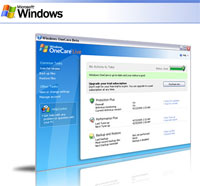 Microsoft has announced that it would begin testing OneCare Live – a PC-health care fix-it all application – with a general release sometime next year.
Microsoft has announced that it would begin testing OneCare Live – a PC-health care fix-it all application – with a general release sometime next year.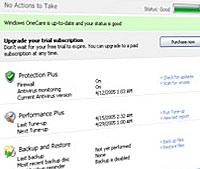 OneCare is a separately sold subscription-based service designed to work as a mainly “hands-off” application, quietly doing its good deeds in the background while sending security updates to users’ computer systems without them having to download or install the fixes.
OneCare is a separately sold subscription-based service designed to work as a mainly “hands-off” application, quietly doing its good deeds in the background while sending security updates to users’ computer systems without them having to download or install the fixes. The BBC has let rip with a new beta service that invites Web developers and designers outside of the organisation to start fiddling about with their content and “create cool new things”.
The BBC has let rip with a new beta service that invites Web developers and designers outside of the organisation to start fiddling about with their content and “create cool new things”. The UK broadcasting goliath made a commitment to support social innovation in response to last year’s Graf Report, and this is echoed in their plans to develop an open community where people can share expertise, ideas, and collaborative efforts.
The UK broadcasting goliath made a commitment to support social innovation in response to last year’s Graf Report, and this is echoed in their plans to develop an open community where people can share expertise, ideas, and collaborative efforts. It’s not all about profit though, with the BBC hoping that contributors will create prototypes on their Web sites to be freely shared with others for non-commercial use.
It’s not all about profit though, with the BBC hoping that contributors will create prototypes on their Web sites to be freely shared with others for non-commercial use.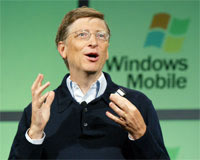 Microsoft ubermensch Bill Gates foresees mobile phones overtaking MP3s as the top choice among portable music players, while dismissing the popularity of Apple’s iPod player as unsustainable.
Microsoft ubermensch Bill Gates foresees mobile phones overtaking MP3s as the top choice among portable music players, while dismissing the popularity of Apple’s iPod player as unsustainable. “If you were to ask me which mobile device will take top place for listening to music, I’d bet on the mobile phone for sure,” Gates told the newspaper.
“If you were to ask me which mobile device will take top place for listening to music, I’d bet on the mobile phone for sure,” Gates told the newspaper. Xbox 360, Microsoft’s successor to their popular Xbox gaming console, will be “unleashed” tonight at a celebrity-packed launch broadcast on MTV, which shows at 8pm in the UK. It was launched on US MTV last night.
Xbox 360, Microsoft’s successor to their popular Xbox gaming console, will be “unleashed” tonight at a celebrity-packed launch broadcast on MTV, which shows at 8pm in the UK. It was launched on US MTV last night. The Xbox will ship with a 12X dual-layer DVD-ROM drive – supporting progressive-scan DVD movies and a host of DVD and CD formats – three USB 2.0 ports, two memory unit slots and support for four wireless game controllers.
The Xbox will ship with a 12X dual-layer DVD-ROM drive – supporting progressive-scan DVD movies and a host of DVD and CD formats – three USB 2.0 ports, two memory unit slots and support for four wireless game controllers. “Xbox 360 marks the beginning of a renaissance in video games,” whooped Don Mattrick, president of Worldwide Studios for Electronic Arts. “The unbelievable Xbox 360 games in development at Electronic Arts will accelerate the industry’s mission to make video games the pre-eminent form of all entertainment.”
“Xbox 360 marks the beginning of a renaissance in video games,” whooped Don Mattrick, president of Worldwide Studios for Electronic Arts. “The unbelievable Xbox 360 games in development at Electronic Arts will accelerate the industry’s mission to make video games the pre-eminent form of all entertainment.” Naturally, gamers love to customise their experience, so there’s a camera option to let vain players add their mugshots into games or even see their friends onscreen as they frag them to an inch of their worthless lives.
Naturally, gamers love to customise their experience, so there’s a camera option to let vain players add their mugshots into games or even see their friends onscreen as they frag them to an inch of their worthless lives. Xbox 360 players can also access recorded TV and digital movies, music, video and photos stored on Windows XP Media Center Edition 2005-based PCs through any Xbox 360 system in the house.
Xbox 360 players can also access recorded TV and digital movies, music, video and photos stored on Windows XP Media Center Edition 2005-based PCs through any Xbox 360 system in the house. Telewest Broadband today announced plans to transform its TV service, giving consumers greater access and control over additional digital programmes.
Telewest Broadband today announced plans to transform its TV service, giving consumers greater access and control over additional digital programmes. There will also be a mix of free and subscription services including popular TV series, music videos and niche content.
There will also be a mix of free and subscription services including popular TV series, music videos and niche content. Eric Tveter, president and chief operating officer at Telewest sunk deeper into his deluxe executive chair and glossed: “We are transforming TV as we know it by giving consumers both a superb choice of programmes and the flexibility to watch them whenever they want. We don’t ever want to hear our customers say there’s nothing on the box or that they have missed their favourite programme.”
Eric Tveter, president and chief operating officer at Telewest sunk deeper into his deluxe executive chair and glossed: “We are transforming TV as we know it by giving consumers both a superb choice of programmes and the flexibility to watch them whenever they want. We don’t ever want to hear our customers say there’s nothing on the box or that they have missed their favourite programme.”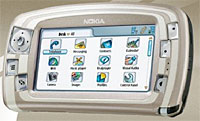 NTL Broadcast and O2 have revealed the first batch of channels to be part of their forthcoming mobile TV trial in the Oxford area, announcing an initial 16 channels including Cartoon Network, CNN, Discovery Channel, Sky Sports News and Sky Travel.
NTL Broadcast and O2 have revealed the first batch of channels to be part of their forthcoming mobile TV trial in the Oxford area, announcing an initial 16 channels including Cartoon Network, CNN, Discovery Channel, Sky Sports News and Sky Travel.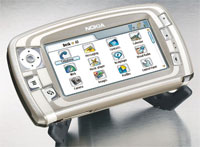 To support the trial, NTL Broadcast is building a new broadcast network of eight DVB-H transmitters to cover 120 square km around Oxford that will enable the lucky participants to receive digital television on the move. To enable a commercial service to be launched in the UK, Ofcom will need to license spectrum and O2 is already lobbying the UK regulator to bring forward plans to distribute radio frequencies for mobile TV services.
To support the trial, NTL Broadcast is building a new broadcast network of eight DVB-H transmitters to cover 120 square km around Oxford that will enable the lucky participants to receive digital television on the move. To enable a commercial service to be launched in the UK, Ofcom will need to license spectrum and O2 is already lobbying the UK regulator to bring forward plans to distribute radio frequencies for mobile TV services. If you’ve ever accessed the Web through a mobile phone or PDA, you may be familiar with the annoyance of finding some sites inaccessible, hard to read or just a right royal pain in the Bluetooth.
If you’ve ever accessed the Web through a mobile phone or PDA, you may be familiar with the annoyance of finding some sites inaccessible, hard to read or just a right royal pain in the Bluetooth. “Web access today is so fundamental, that it shouldn’t be hampered by wires,” table-thumped Philipp Hoschka, W3C’s deputy director for Europe.
“Web access today is so fundamental, that it shouldn’t be hampered by wires,” table-thumped Philipp Hoschka, W3C’s deputy director for Europe.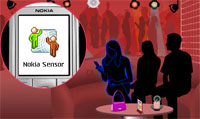 Going up to people and actually introducing yourself has become, like, so uncool with the introduction of the Nokia Sensor Bluetooth widget.
Going up to people and actually introducing yourself has become, like, so uncool with the introduction of the Nokia Sensor Bluetooth widget.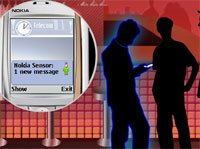 The Sensor app comes with the usual yoof-tastic features, like Buddy Alerts, which tells you if someone you know is nearby (isn’t that what eyes are for?) and ‘Group Codes’ which bleep when someone with similar interests is lurking in the area.
The Sensor app comes with the usual yoof-tastic features, like Buddy Alerts, which tells you if someone you know is nearby (isn’t that what eyes are for?) and ‘Group Codes’ which bleep when someone with similar interests is lurking in the area. The BBC has opened up its RSS news feeds to commercial Websites for the first time, with a new set of terms and conditions letting other sites integrate the BBC feeds for free, and free from offline contractual negotiation.
The BBC has opened up its RSS news feeds to commercial Websites for the first time, with a new set of terms and conditions letting other sites integrate the BBC feeds for free, and free from offline contractual negotiation. Pete Clifton, editor of the BBC News Website said: “Liberating the availability of our content for re-use is an important step for the BBC. We’ve been a bit cautious about it up to now but there’s a real demand for us to provide this service. If we are to build public value it’s important that we respond to this demand.”
Pete Clifton, editor of the BBC News Website said: “Liberating the availability of our content for re-use is an important step for the BBC. We’ve been a bit cautious about it up to now but there’s a real demand for us to provide this service. If we are to build public value it’s important that we respond to this demand.”